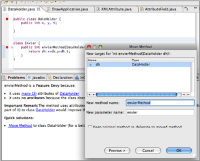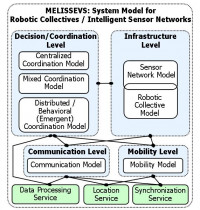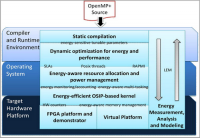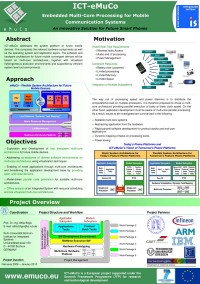Proiecte de cercetare

JCBICS-UDPUT: Joint Cross-Border Internet Communication System of the University of Debrecen and Politehnica University of Timisoara
University of Debrecen, as main partner, and the Politehnica University of Timisoara, as cross-border partner, submit a proposal with the stated goal of integrating in a cross-border communication system the local network systems of the two partners. The overall objective of the project is to enable enhanced capacity for cross-country cooperation and interaction between and within the participating universities by providing high quality WiFi system and IP streaming system for the students, professors and researchers at the University of Debrecen and Politehnica University of Timisoara, aiming at supporting the synchronization of educational, research and development, and other scientific activities of the cooperating universities.
This project influences the cooperation activity of the universities involved, facilitating collaboration between the target groups, university students, researchers.
Marian SALAVAT
GEMSCLAIM: GreenEr Mobile Systems by Cross LAyer Integrated energy Management
Personal computing currently faces a rapid trend from desktop machines towards mobile services, accessed via tablets, smartphones and similar terminal devices. With respect to computing power, today´s handheld devices are similar to Cray-2 supercomputers from the 1980s. Due to higher computational load (e.g. via multimedia apps) and the variety of radio interfaces (such as WiFi, 3G, and LTE), modern terminals are getting increasingly energy hungry. For instance, a single UMTS upload or a video recording process on today´s smartphones may consume as much as 1.5 Watts, i.e. roughly 50% of the maximal device power. In the near future, higher data rates and traffic, advanced media codecs, and graphics applications will ask for even more energy than the battery can deliver. At the same time, the power density limit might lead to a significant share of “Dark Silicon” at 22nm CMOS and below. Obviously, disruptive energy optimizations are required that go well beyond traditional technologies like DVFS (dynamic voltage and frequency scaling) and power-down of temporarily unused components.
The GEMSCLAIM project aims at introducing novel approaches for reducing this “greed for energy”, thereby improving the user experience and enabling new opportunities for mobile computing. The focus is on three novel approaches: (1) cross layer energy optimization, ranging from the compiler over the operating system down to the target HW platform, (2) efficient programming support for energy-optimized heterogeneous Multicore platforms based on energy-aware service level agreements (SLAs) and energy-sensitive tunable parameters, and (3) introducing energy awareness into Virtual Platforms for the purpose of dynamically customizing the HW architecture for energy optimization and online energy monitoring and accounting. GEMSCLAIM will provide new methodologies and tools in these domains and will quantify the potential energy savings via benchmarks and a HW platform prototype.
Gabriel GIRBAN, Lucian BARA
ICT-eMuCo: Embedded Multi-Core Processing for Mobile Communicating Systems
ICT-eMuCo addresses the platform architecture of future mobile devices. This comprises the relevant controller elements as well as the operating system and application layers. It is expected that the computational performance needed by these devices will grow exponentially due to the growing number of features implemented and the advances in the wireless communication standards. The fast growing number of applications and the resulting diversification requires a co-existence of open and protected environments.
It is therefore proposed to choose a multi-core architecture to get the best ratio of performance and power consumption while maintaining a high flexibility and scalability in the system through variations in number of cores, cache sizes, clock speeds etc. Existing multi-cores are taken as a starting point for the controller architecture. The actual implementation of e. g. the cache and memory system will be optimized to the specific needs as well as the extension by hardware accelerators for dedicated tasks.
Virtualization technology will be employed to abstract the applications including potential legacy operating systems from the hardware architecture. This provides the means to separate real-time from non-real-time and secure from open domains. To account for the embedded nature of mobile devices and its limitations in performance and power consumption the virtualization functionalities are supported by hardware where appropriate.
The awareness for the existence of multi-cores must also arise at the programmer's level. This is taken care of by a model-driven code generation technology based on SDL for typical communications protocol tasks and UML for the application development and modelling.
Dacian TUDOR, Georgiana MACARIU

Metode si instrumente pentru asigurarea continua a calitatii in sisteme software complexe
Impactul din ce in ce mai mare al sistemelor software si gradul ridicat de dependenta al societatii de acestea, indeosebi prin infrastructura fac imperativa capacitatea software-ului de a evolua, pentru a se adapta noilor cerinte economico-sociale.
Pentru a face posibila evolutia software-ului, trebuie asigurata o calitate superioara a proiectarii si implementarii acestuia.
Din acest motiv software-ul existent trebuie sustinut prin sisteme automate de analiza, diagnostic si ameliorare la nivel de cod si de proiectare.
Proiectul propune o abordare agila (continua) a asigurarii calitatii for sisteme software complexe, la nivelul codului (prin intermediul analizei statice si a testarii) si a proiectarii (prin detectia si corectia erorilor de proiectare).

MELISSEVS: Dezvoltarea și analiza unui model integrat de reprezentare a sistemelor colaborative robotice și de senzori inteligenți în aplicații de explorare-supraveghere de mediu
Proiectul abordează o arie tematică multidisciplinară ce acoperă domenii prioritare de cercetare fundamentală și aplicativă: calitatea și securitatea mediului, sisteme colaborative robotice, rețele de senzori inteligenți, comportament emergent, modelare matematică și formalizare.
Scopul proiectului este conceperea, dezvoltarea și analiza unui model integrat de reprezentare a sistemelor colaborative robotice și de senzori inteligenți, MELISSEVS, destinat realizării aplicațiilor de explorare-supraveghere de mediu, cu impact direct asupra societății informaționale moderne, introducerii tehnologiilor de ultimă oră în industrie și în viața cotidiană, precum și în protecția mediului. Principalele obiective se concentrează asupra studierii și implementării urmatoarelor aspecte: definirea, integrarea și validarea unui set coerent de modele pentru formalizarea tiparelor de comportament colaborativ, a infrastructurii, serviciilor oferite și a interacțiunilor din cadrul sistemelor colective robotice și de senzori inteligenți, precum și evaluarea întregului sistem de modelare în contextul unui set de aplicații de explorare, monitorizare și operare în diverse tipuri de mediu.
Resursele implicate în cadrul proiectului cuprind o echipă de cercetare cu o bogată experiență teoretică și practică în domeniu (doi doctori și trei doctoranzi, cadre didactice), precum și o rețea CDI interdisciplinară, RTE-DSP, compusă din 4 laboratoare moderne, dotate corespunzător.
Rezultatele proiectului se vor concretiza în sistemul integrat de modele MELISSEVS ce va oferi un framework ideal pentru dezvoltarea și analiza aplicațiilor complexe ce implică inteligență, percepție și operare distribuite, de tip colaborativ, precum și într-o serie de metodologii complete, cercetări și aplicații în domeniu, finalizarea programelor de doctorat pentru trei membri, și un număr important de publicații științifice de cel mai înalt nivel.




